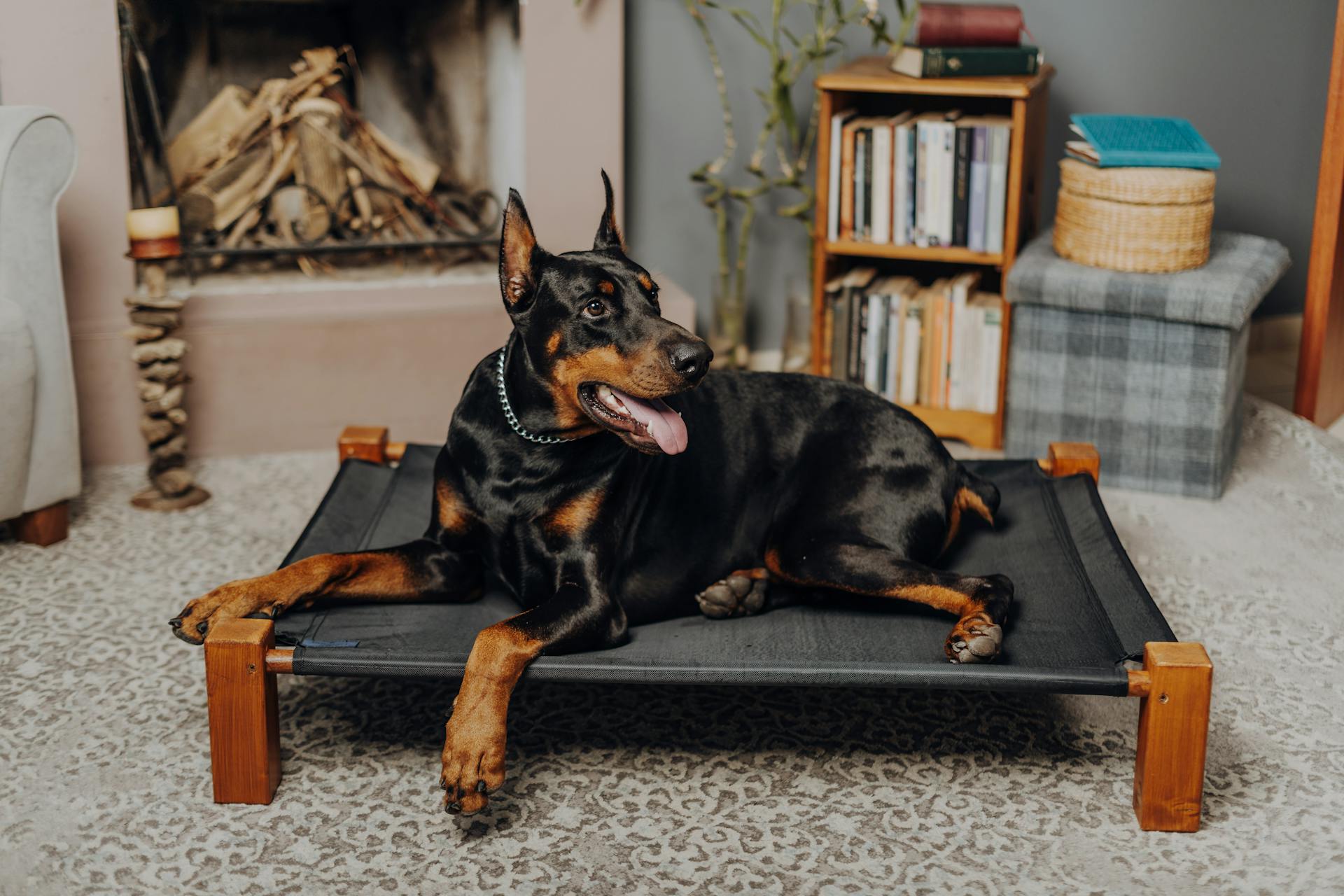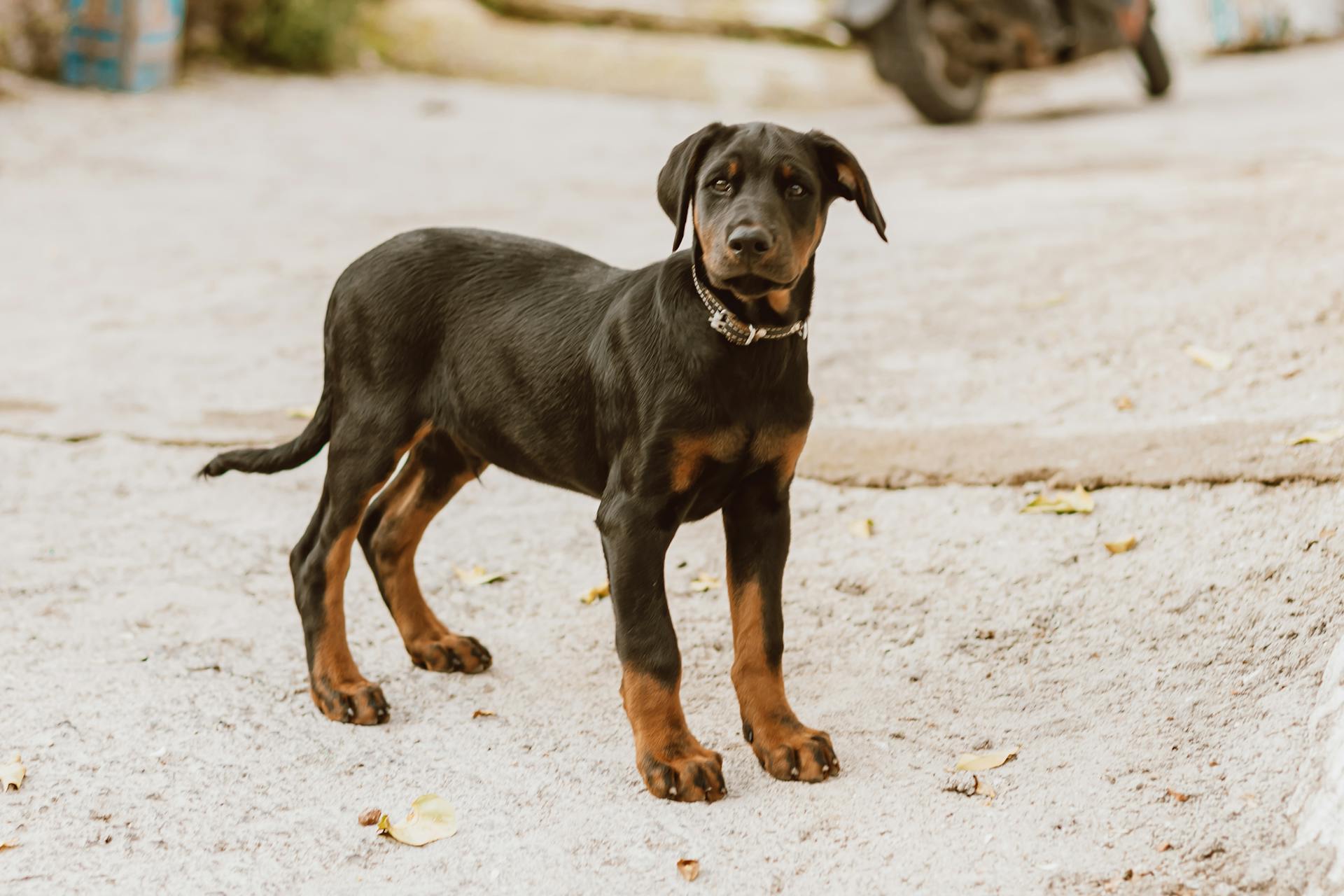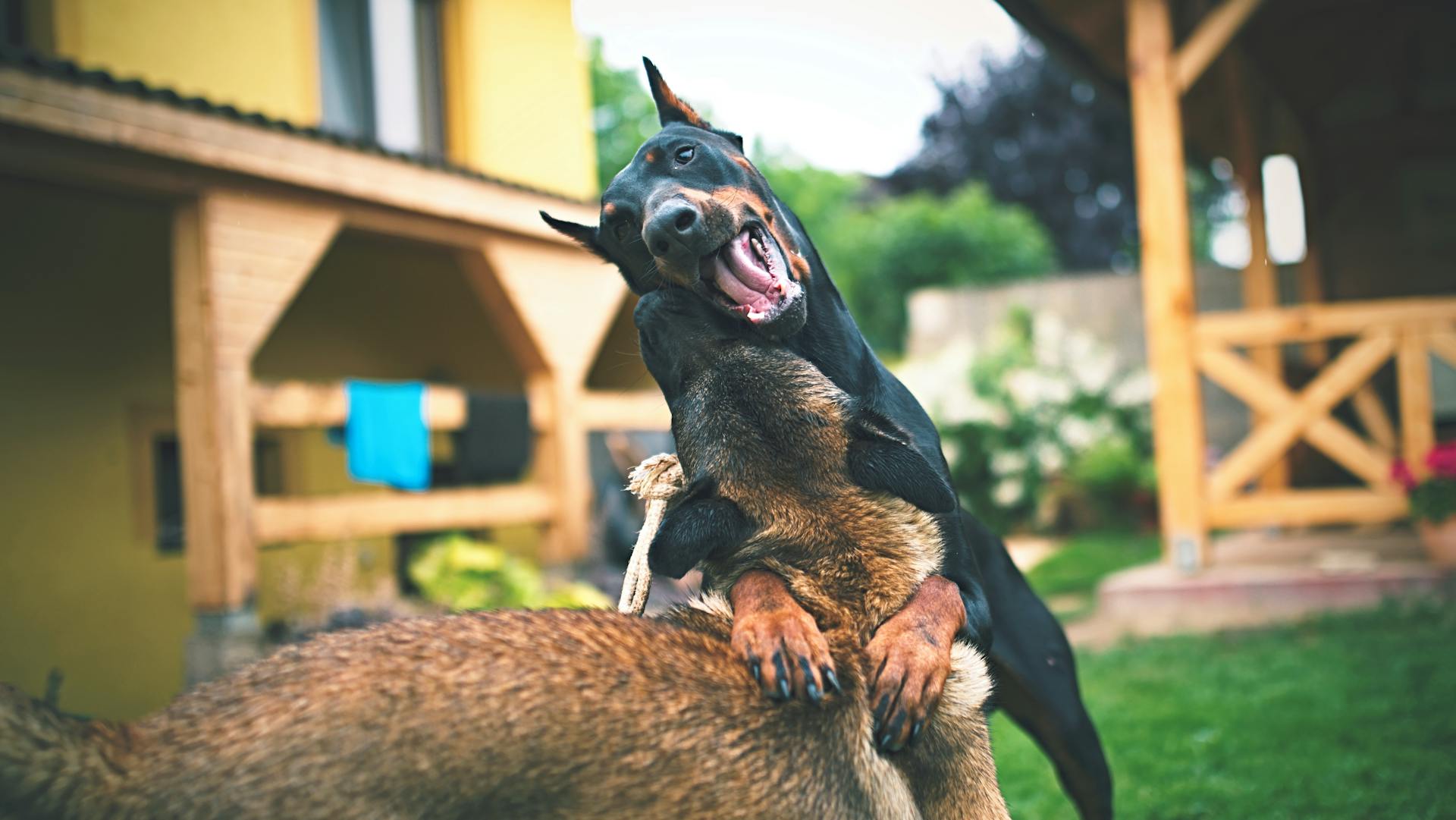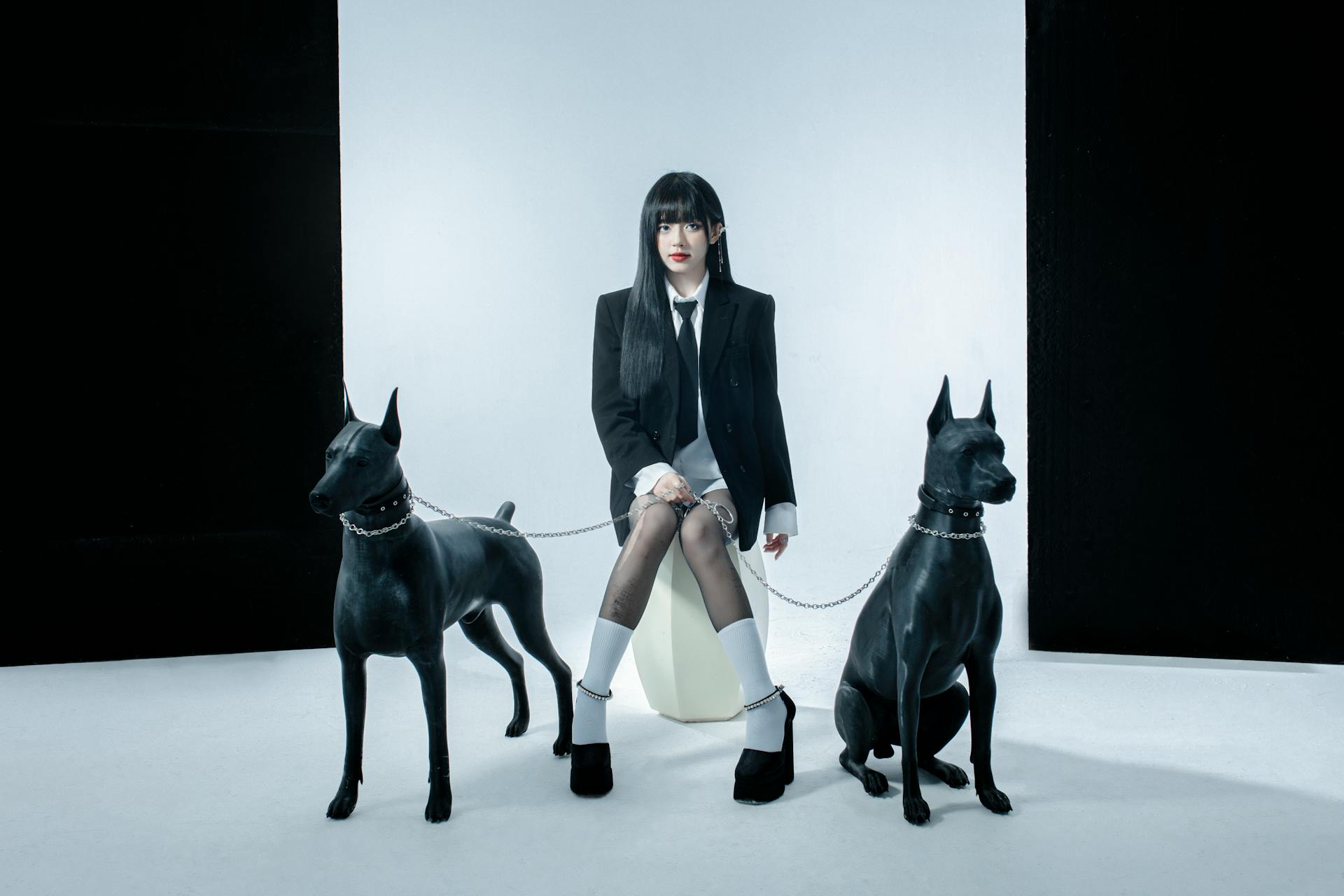
The Doberman Pinscher is a sleek and agile breed that's often misunderstood. They're not just intimidating-looking dogs, but also loving companions.
Doberman Pinschers are known for their short coats, which require minimal grooming. This makes them a great choice for busy owners.
In terms of size, Doberman Pinschers typically weigh between 60-80 pounds and stand 24-28 inches tall at the shoulder.
Getting Started
If you're considering bringing a dog like a Doberman Pinscher into your life, start by researching their needs and personality traits. They're a loyal breed that thrives on attention and interaction.
Doberman Pinschers are intelligent dogs that require regular exercise and mental stimulation to prevent boredom and destructive behavior. A daily walk or run, combined with puzzle toys and training sessions, will keep them happy and engaged.
Their loving personality makes them a great companion, but they do have a protective nature that requires careful socialization and training. This means exposing them to new people, places, and experiences from an early age.
As a breed, Doberman Pinschers are ready to be your soulful sidekick, but they do require a commitment to their care and well-being.
You might enjoy: Doberman Pinscher Guard Dog Training
Health and Nutrition
Dogs like Doberman Pinschers require a balanced diet that includes easily digestible protein for healthy muscles, including the heart. Omega-3 fatty acids (DHA/EPA) support healthy skin, coat, kidneys, and heart.
To reduce the risk of health issues, regular veterinary check-ups are essential, alongside a healthy diet and plenty of exercise. Doberman Pinschers may be prone to health issues like hip dysplasia, cardiomyopathy, hypothyroidism, and Von Willebrand's disease.
A pre-portioned meal plan can help maintain a healthy weight, which is crucial for joint health and staving off other health issues. Large-breed dogs like Dobermans typically take longer to fully develop their musculoskeletal system, so it's essential to structure meal size and time.
Here are some common health issues that can affect Doberman Pinschers:
- Albinism
- Bloat
- Dilated cardiomyopathy: enlarged heart
- Hip dysplasia: painful skeletal condition that affects the hips
- Hypothyroidism: underactive thyroid
- Narcolepsy
- Progressive retinal atrophy: degenerative diseases affecting the eyes
- Wobbler syndrome: spinal disease seen in larger dogs that can cause neck pain
- Hair loss: blue Dobermans are more prone
- Von Willebrand disease: clotting disorder
To ensure your Doberman Pinscher receives a complete and balanced diet, feed commercial kibble or wet food approved by the Association of American Feed Control Officials (AAFCO).
Health Concerns
Doberman Pinschers are generally a healthy breed, but like all breeds, they can be prone to certain health issues.
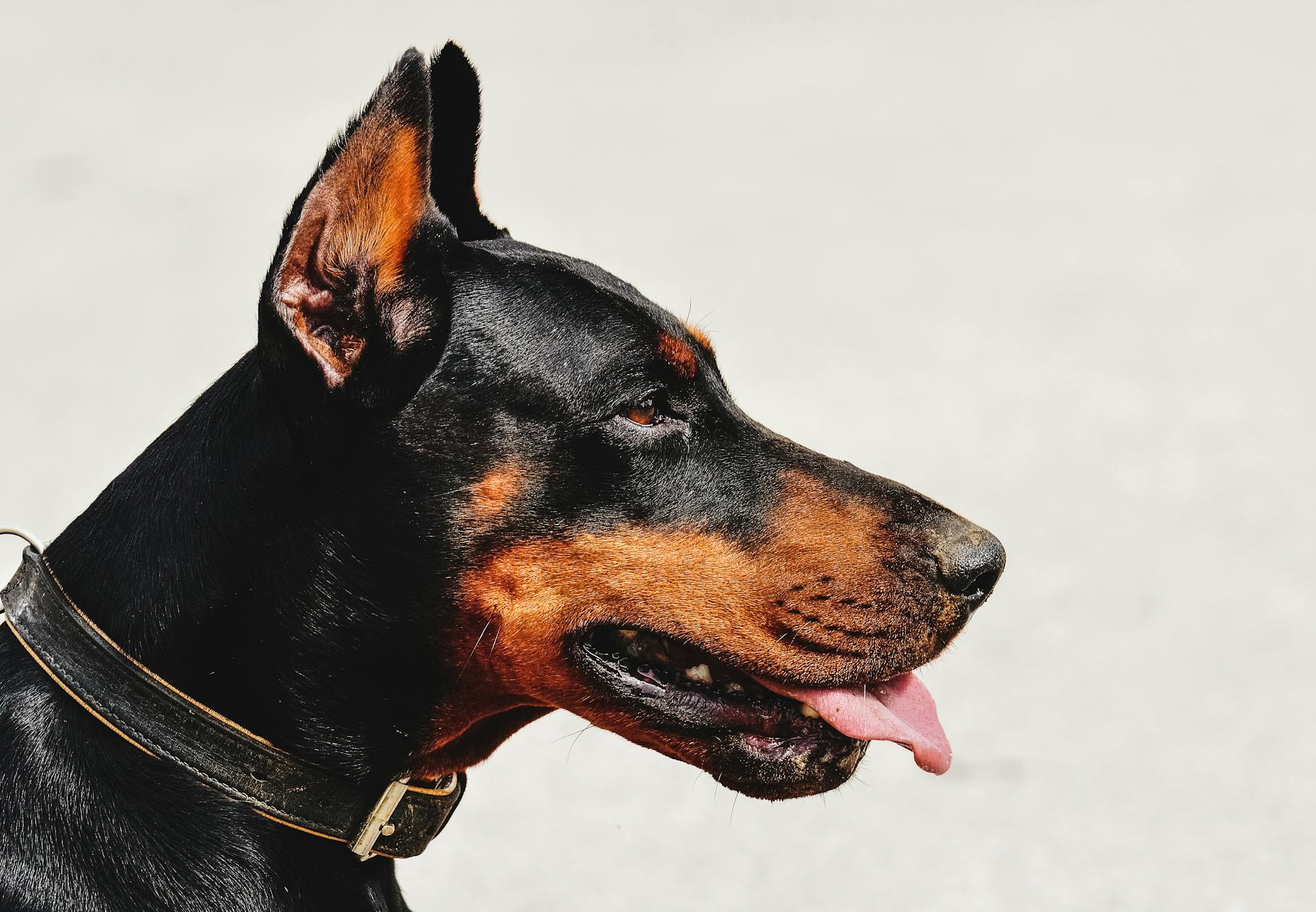
Their lifespan is 10-12 years, and regular veterinary check-ups are crucial to help them thrive.
A balanced diet and plenty of exercise are essential to maintaining their health.
Some health concerns to be aware of include hip dysplasia, a painful skeletal condition that affects the hips, and Von Willebrand's disease, a clotting disorder.
Dilated cardiomyopathy, an enlarged heart, and hypothyroidism, an underactive thyroid, are also potential issues.
In addition, Dobermans may experience bloat, a life-threatening condition that requires immediate veterinary attention.
Here are some potential health issues to look out for:
- Hip dysplasia: painful skeletal condition that affects the hips
- Von Willebrand's disease: clotting disorder
- Dilated cardiomyopathy: enlarged heart
- Hypothyroidism: underactive thyroid
- Bloat: life-threatening condition
It's also worth noting that Dobermans can be prone to certain eye and skin issues, such as progressive retinal atrophy and hair loss.
Nutrition
Feeding your Doberman a complete and balanced diet is crucial for their overall health. This can be achieved by providing easily digestible protein for healthy muscles, including the heart.
Dobermans need omega-3 fatty acids (DHA/EPA) in their diet to support healthy skin, coat, kidneys, and heart. These natural anti-inflammatories can be added to their diet with the help of your veterinarian.
A unique perspective: Doberman Pinscher Diet
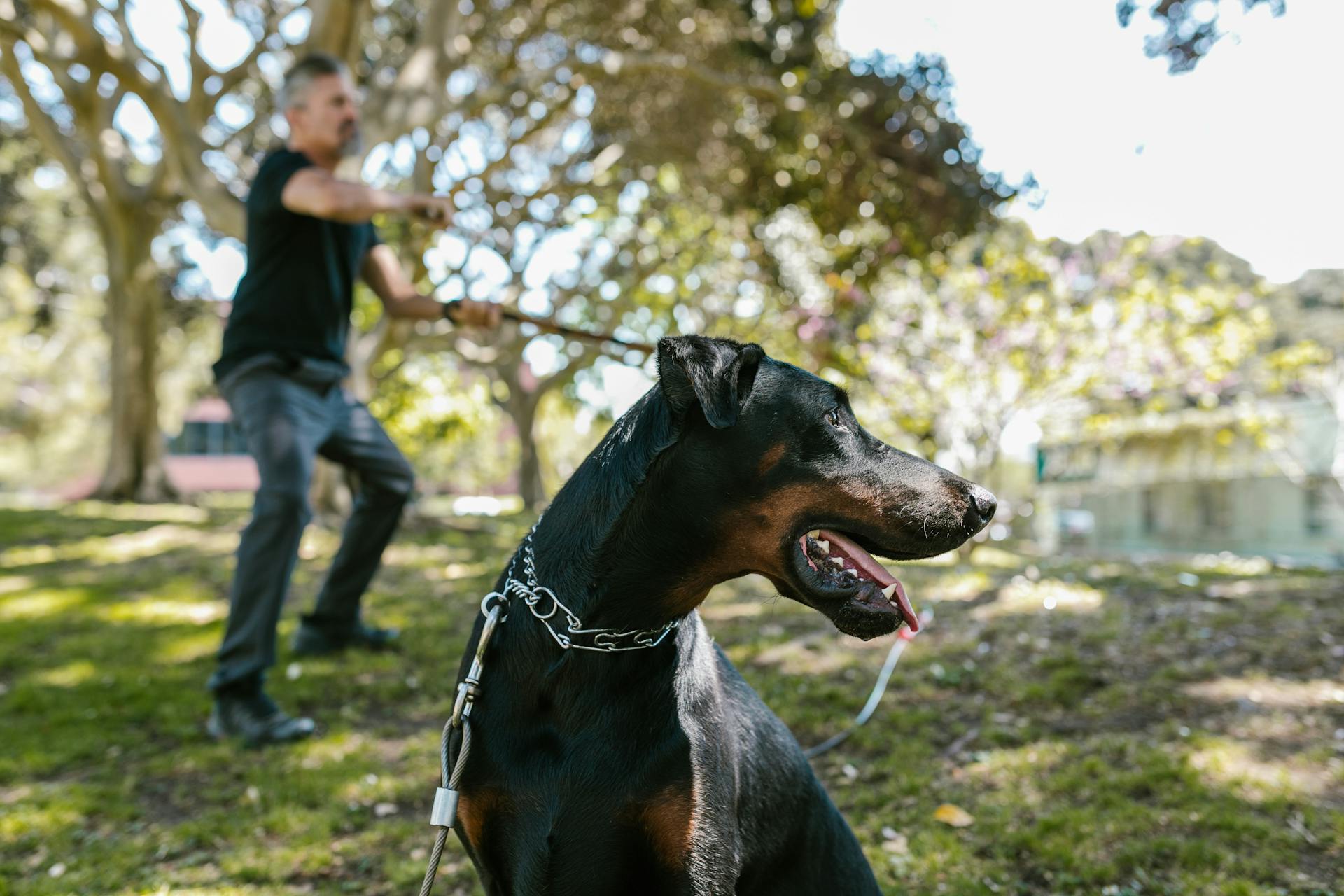
A pre-portioned meal plan can be a great way to ensure your Doberman is getting the right number of calories every day. This helps maintain a healthy weight, which is essential for keeping joints healthy.
Large-breed dogs like Dobermans typically take longer to fully develop their musculoskeletal system. This means feeding them carefully during growth is essential to avoid orthopedic diseases and obesity.
A diet of fresh, lightly cooked food has been shown to be more digestible than processed kibble. This can promote a healthy gut and good digestion, resulting in better, smaller poops.
Feeding your Doberman two meals per day instead of one larger meal can reduce the risk of GDV or bloat. This is especially important for Doberman puppies, who need to eat more frequently.
Avoid exercising your pup directly before or after eating, as this can also increase the risk of GDV or bloat. Elevated food bowls should also be avoided, as they can make this risk even higher.
The recommended caloric intake for Doberman Pinschers varies due to different physical sizes, metabolisms, and activity levels. It's essential to talk to your veterinarian about how much to feed your Doberman to ensure they're getting the right amount of calories.
A different take: Does Dog Food Taste Good to Dogs
Exercise Needs
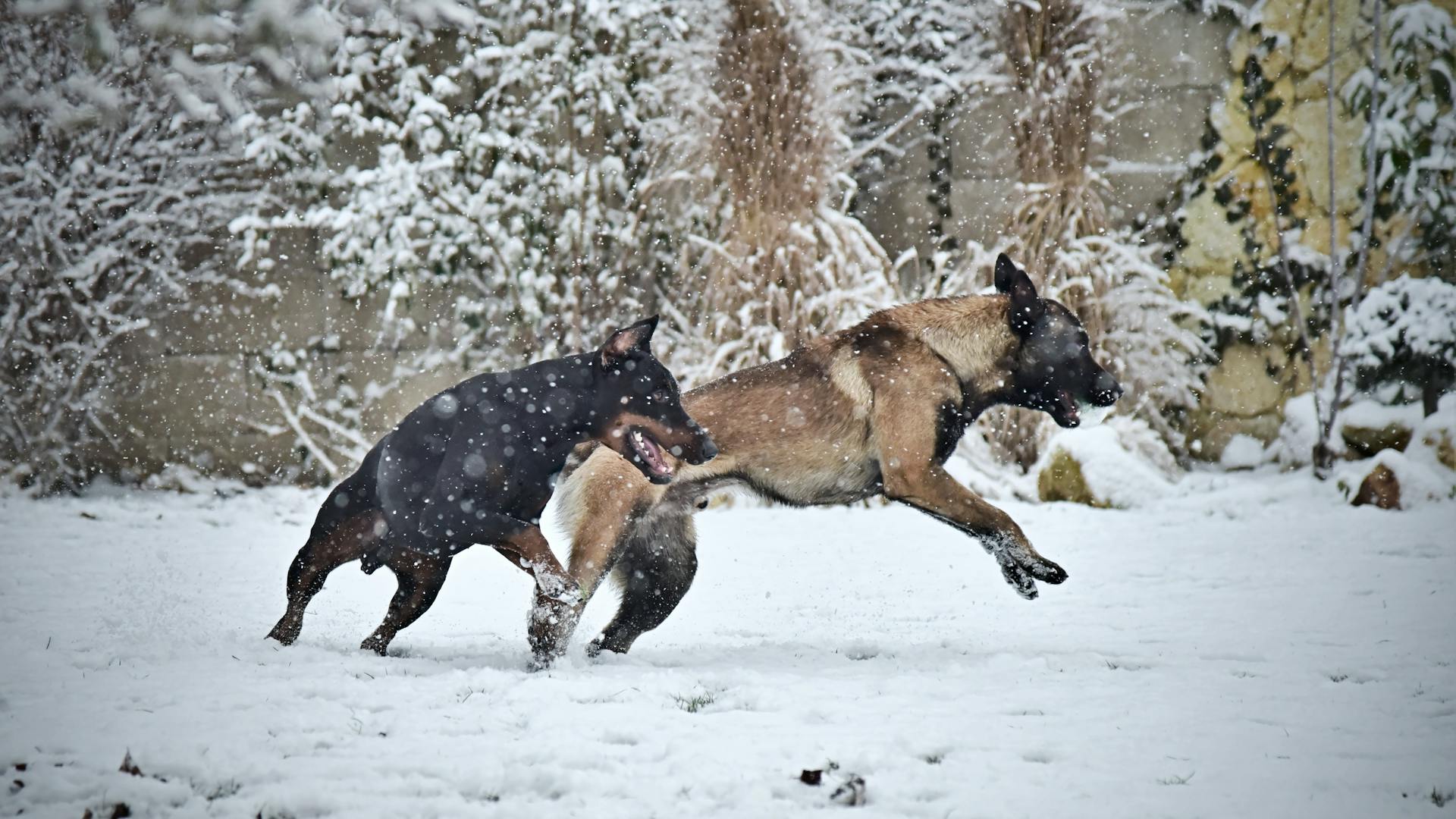
Dobermans need a significant amount of exercise to remain mentally and physically healthy. They require a family who is constantly active and ready to involve them in daily activities.
A lot of physical and mental exercise is necessary to keep your Doberman content. They'll enjoy long walks, time romping around a yard, and organized activities like agility and flyball.
Dobermans are not meant for the sedentary or laid-back type, so if you're looking for a couch potato, this breed is not for you. If they're not having fun, try something different.
On rainy days, activities like hide-and-seek or food puzzles can be a great way to keep your Doberman engaged. Consult with your vet to confirm that any exercise program or activity is appropriate for your individual Doberman.
You might like: Doberman Pinscher Not Cropped
Rabies Information
Staying up-to-date on your dog's rabies vaccination is crucial—and often the law.
Rabies is a serious disease that can be fatal to dogs. Staying current on your dog's vaccinations is the best way to protect them from this deadly virus.
The rabies virus is usually transmitted through the bite of an infected animal. This is why it's essential to keep your dog away from wild animals and stray dogs.
Staying on top of your dog's vaccination schedule can also help prevent the spread of rabies in your community.
Pica in Dogs: Spotting and Concerns
Pica in dogs is a disorder where they compulsively ingest things that aren't food. This can be a serious issue if left unchecked.
Dogs with pica often eat non-food items like dirt, rocks, or even their own fur. I've seen dogs do some pretty weird things when they have pica.
Pica can be caused by nutritional deficiencies, boredom, or even anxiety. For example, if a dog isn't getting enough minerals in their diet, they might start eating dirt to compensate.
Dogs with pica may also eat things that are toxic to them, which can lead to serious health problems. So, if you notice your dog eating non-food items, it's essential to take action.
Some common signs of pica in dogs include eating non-food items, vomiting, or having diarrhea. If you're concerned about your dog's behavior, it's always a good idea to consult with a veterinarian.
Grooming and Care
Doberman Pinschers are energetic dogs that require an active lifestyle to keep them physically and mentally stimulated.
They have a strong prey drive, so it's essential to keep them on a leash or inside a fence when they're outside, as they may chase after neighborhood squirrels.
Doberman Pinschers are moderate to heavy shedders, and daily or a couple of times a week brushing can help manage shedding.
Regular ear cleanings are recommended to prevent infections, and using a veterinarian-recommended cleanser is a good idea.
Their nails need to be trimmed regularly, but be careful not to cut the quick, which can be tough to see due to their nails' dark color.
Grooming Guide
Doberman Pinschers have a short, smooth coat that requires minimal grooming, but they are moderate shedders and need to be brushed weekly to minimize shedding.
Their coat colors can vary, including tan and black, blue, red, brown, and white, with rust-colored markings above the eyes, on the muzzle, on all legs, and below the tail.
Regular ear cleanings are recommended, and you should use a veterinarian-recommended cleanser to keep their ears healthy.
If this caught your attention, see: Doberman Pinscher Coat Colors
Doberman Pinschers are clean dogs and rarely have an odor, but they do need regular nail trimming to prevent overgrowth.
You may be able to go six to eight weeks between baths, but this will depend on how dirty they get outside, and you should check out a general bathing guide for more tips.
Pet Care Considerations
As a pet owner, you want to make sure you're providing the best care for your Doberman Pinscher. They require routine physical and mental exercise, so they do best in a home with active pet parents.
Dobermans are energetic dogs and need to be kept physically and mentally stimulated to prevent destructive behaviors. They have a strong prey drive, so homes with small animals like guinea pigs, rabbits, or cats may not be ideal unless there's been extensive socialization and training.
A healthy Doberman should have a physical exam performed by a veterinarian at least once annually. This is especially important because the breed is predisposed to dilated cardiomyopathy, a type of heart disease that can cause symptoms like lethargy, exercise intolerance, coughing, or collapse.
Regular grooming is also essential for Dobermans, who are moderate to heavy shedders. Their short, smooth coat requires regular brushing to prevent matting and tangling.
Dobermans can be wary around new people due to their loyalty and love of family, so early and consistent training and socialization are crucial. This will help them grow into well-adjusted adult dogs and reduce the risk of unwanted behaviors.
Behavior and Training
Doberman Pinschers are extremely intelligent and thrive in obedience and basic dog training. They need an outlet for their energy, so providing a consistent training and socialization routine early in life is crucial.
They are an excellent family companion and protector, but their strong prey drive can lead to chasing small animals. If introduced properly, Dobermans and cats can live together well.
Dobermans are eager to please and sensitive, so they require kindness and gentle training. They can become destructive if left alone for long periods without exercise and mental stimulation.
See what others are reading: Doberman Pinscher Training
Getting Started in Dog Sports
Doberman pinschers are highly trainable and motivated to please their owners, so it's no surprise they excel in dog sports.
To get started, you'll want to find a sport that suits your dog's energy level and abilities. Dr. Sophie Liu recommends at least an hour or two of exercise per day to keep your Doberman happy and focused.
A consistent and fair training approach is essential, especially for sensitive dogs like Dobermans. Make sure all family members are on the same page to avoid confusing your dog.
If you're new to dog training, consider starting with basic obedience commands and gradually introducing more complex tasks. This will help you build a strong bond with your dog and prevent behavioral problems.
Exercise and training go hand-in-hand, so be sure to incorporate physical activity into your daily routine. A tired dog is a happy dog, and a happy dog is more receptive to training.
For more insights, see: All about Dogs Dog Training
To give you a head start, here are some popular dog sports and activities to consider:
- Agility training: a fun and physically demanding sport that challenges your dog's speed, agility, and obedience.
- Tracking: a great way to channel your Doberman's high prey drive and provide mental stimulation.
- Obedience training: a fundamental skill that every dog should master, regardless of breed or age.
- Therapy work: a rewarding way to give back to your community and provide comfort to those in need.
Remember, every dog is unique, so be sure to tailor your training approach to your Doberman's individual needs and personality. With patience, consistency, and positive reinforcement, you'll be well on your way to a happy and well-behaved companion.
Behavior
Dobermans are extremely intelligent, alert, and loyal dogs that thrive on being part of a family and protecting their pack.
They have a strong prey drive, which can lead to chasing small animals, so introducing them to cats properly is essential.
Dobermans are great with kids, especially if they're socialized early, but it's crucial to supervise interactions between young children and dogs.
They're naturally protective, but only if they perceive a threat, and with proper training and socialization, they can become well-adjusted and loving companions.
Dobermans require a job to do and problems to solve, which is why they need consistent training and exercise to prevent boredom and behavioral problems.
They're sensitive dogs that respond well to positive reinforcement training, and consistency is key to strengthening the bond between you and your Doberman.
Early socialization and training are vital to prevent unwanted behaviors, such as barking at squirrels, and to ensure they're confident when you're not around.
Dobermans can become destructive if left alone for long periods without a way to entertain themselves, so providing them with plenty of fun and interesting things to do is essential.
They're eager to please and love to be close to their owners, often following them from room to room, and they thrive on being part of an active family that can provide them with the exercise and attention they need.
Dobermans are naturally protective, but they're not aggressive, and with proper training and socialization, they can become the best kind of bodyguard: always on alert, but only springing into action when there's a real need.
A unique perspective: Why Don't Dogs like When You Blow on Them?
Frequently Asked Questions
Should I get a beauceron or a Doberman?
Consider a Doberman if you want to minimize herding tendencies, or a Beauceron if you prefer a slightly less intense guarding instinct.
What rare dog breed looks like a Doberman?
The Kanni dog is a rare breed that resembles a Doberman Pinscher in appearance. Native to India, this tall dog has a unique look with naturally cropped ears and a long tail.
What two dogs make a Doberman?
The Doberman Pinscher is a cross between several breeds, but its exact ancestry is unknown. It's believed to have originated from a mix of breeds including the Rottweiler and German Pinscher.
Sources
- https://www.akc.org/dog-breeds/doberman-pinscher/
- https://www.petmd.com/dog/breeds/doberman-pinscher
- https://figopetinsurance.com/blog/doberman-pinscher-breed-guide
- https://www.metlifepetinsurance.com/blog/breed-spotlights/doberman-pinscher/
- https://www.thefarmersdog.com/digest/doberman-pinscher-care-guide-personality-history-food/
Featured Images: pexels.com
